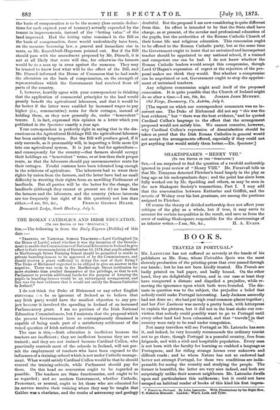THE ROMAN CATHOLICS AND IRISH EDUCATION.
[TO THE EDITOR OF THE "SPECTATOR.") SIR,—The following is from the Daily Express (Dublin) of this date :— " Tam:sum or NATIONAL SolooL TEACHERS.—Lord Carlingford [in the House of Lords] asked whether it was the intention of the Govern- ment to enable the Commissioners of National Education in Ireland to give effect to their recommendation of December 10, 1874, that pupils admitted to Marlborough Street Training School should be permitted to reside in private boarding-houses to be approved of by the Commissioners, and should receive a grant sufficient to defray the cost of their living ? The Duke of Richmond regretted to be obliged to give an answer in the negative. There was room in the Marlborough Street institution for more students than availed themselves of the privilege, so that to ask Parliament to provide additional funds for the purpose of keeping the pupils in boarding-horses would be an extravagant arrangement, and this was the best evidence that it would not satisfy the Roman Catholics in Ireland."
I do not think the Duke of Richmond or any other English statesman can be so ignorant of Ireland as to believe that any Irish party would have the smallest objection to any pro- ject because it involved the spending in Ireland of an increased Parliamentary grant. I am no partisan of the Irish National Education Commissioners, but I maintain that the proposal which the present Government have so contemptuously dismissed is capable of being made part of a satisfactory settlement of the vexed question of Irish national education.
The case is this,—Irish education is inefficient because the teachers are inefficient ; they are inefficient because they are not trained ; and they are not trained because Cardinal Cullen, who practically controls most of the schools in Ireland, will not per- mit the employment of teachers who have been exposed to the influences of a training-school which is not under Catholic manage- ment. What would satisfy Cardinal Cullen would be that he should control the training-schools, while Parliament should pay for them. On this head no concession ought to be regarded as possible. The teachers are State functionaries, and ought to be so regarded ; and no modern Government, whether Catholic, Protestant, or neutral, ought to let those who are educated for its service receive their training where they may be taught that Galileo was a charlatan, and the truths of astronomy and geology doubtful. But the proposal I am now considering is quite different from this. Its effect is intended to be that the State shall have charge, as at present, of the secular and professional education of the pupils, but the authorities of the Roman Catholic Church of their home life and religious education. This concession ought to be offered to the Roman Catholic party, but at the same time the Government ought to insist that no untrained and incompetent teacher should be appointed to any national school, if a trained and competent one can be had. I do not know whether the Roman Catholic leaders would accept this compromise, though Lord O'Hagan's expression of regret at the rejection of the pro- posal makes me think they would. But whether a compromise can be negotiated or not, Government ought to stop the appoint- ment of untrained teachers.
Any religious communion might avail itself of the proposed concession. It is quite possible that the Church of Ireland might do so after a time.—I am, Sir, &c. JOSEPH JOHN MURPHY.
Old Forge, Dunmurry, Co. Antrim, July 6. .
[The report on which our correspondent comments was an in- correct one. The Duke of Richmond did not say " this was the- best evidence," but " there was the best evidence," and he quoted Cardinal Cullen's language to the effect that the arrangement proposed would not satisfy him. We cannot conceive, however, why Cardinal Cullen's expression of dissatisfaction should be taken as proof that the Irish Roman Catholics in general would not accept the arrangements offered, especially if they could not get anything that would satisfy them better.—En. Spectator.]


































 Previous page
Previous page